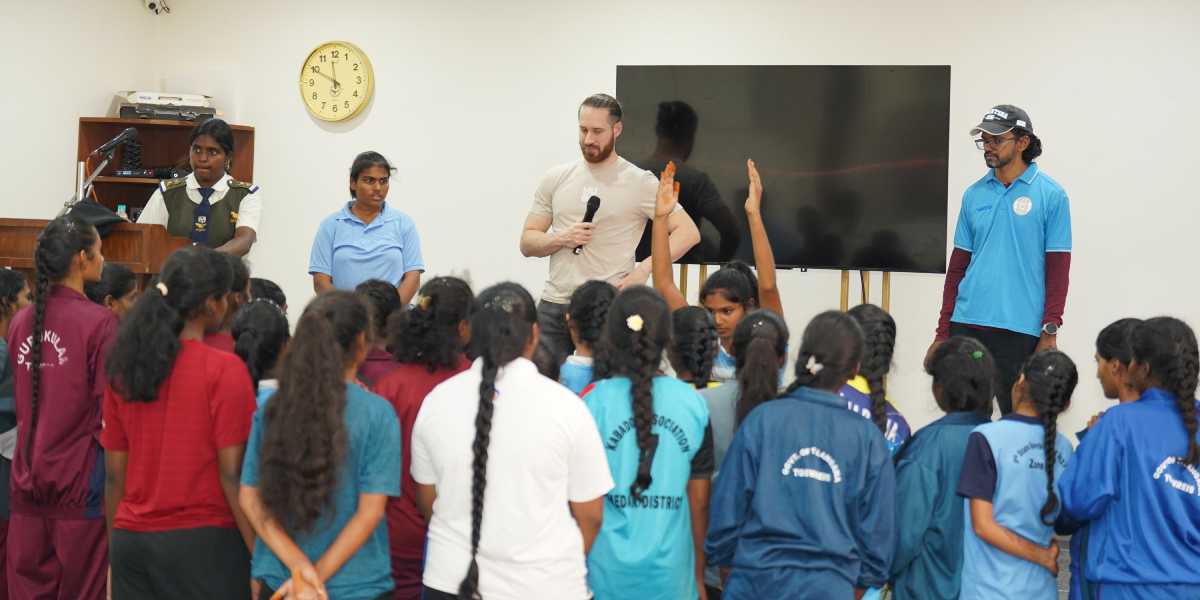Published Oct 24, 2025 | 11:08 AM ⚊ Updated Oct 26, 2025 | 10:49 AM

Splink team at Hyderabad Public School
Synopsis: Splink Pro, an AI platform launched in Hyderabad, transforms talent identification in Indian schools using smartphone-based cognitive, physical, and nutrition analytics. Founded by Anand Mallipudi, it identifies potential like 13-year-old Charan’s sprinting talent, reduces injuries, and enhances focus. Backed by experts like Pullela Gopichand, Splink targets 500 schools, aligning with India’s education and sports initiatives.
Charan runs. At 13, his stride carries the kind of rhythm coaches spend years trying to teach. But six months ago, no one knew he could run at all.
He attended the school in Hyderabad, where physical education meant an hour on the playground twice a week. Then his school adopted Splink Pro, an AI platform that turns smartphones into performance laboratories.
A teacher pointed a phone camera at Charan during a routine movement assessment. The algorithm flagged two things: exceptional sprinting mechanics and a biomechanical asymmetry that predicted injury with over 90 percent accuracy.
Today, Charan trains under expert guidance. He has logged zero injuries. His story marks one data point in a pattern unfolding across Indian schools, academies, and rural communities—a pattern that asks whether intelligence, when scaled correctly, can find potential hiding in plain sight.
This has happened through Splink, an AI-based human performance platform that merges cognitive assessment, sports science, and nutrition analytics into a unified, mobile-first solution. Built through international collaboration with partners from Europe and India, Splink works to identify, develop, and protect talent at scale.
Anand Mallipudi founded Splink on 25 May 2025. Mohit Mathur, who had spent 28 years building technology systems across three continents, joined as the CEO. As co-founder and global head of product development at LiveSmart, a Mitsubishi-backed company operating in the US, Japan, and India, Mathur had led teams through digital transformation at Accenture, Consolidated Graphics, and Intelligroup. He understood how to make complex systems work at scale.
But India presented a different problem. The country surged ahead in technology while lacking scalable systems to nurture human potential at the grassroots. Schools in Tier 2 and Tier 3 cities, along with rural communities, had no unified way to assess and enhance student capabilities scientifically.
Fitness trackers measured steps. Educational apps taught lessons. Nothing connected cognitive development, nutrition, and physical performance into one system that could function in low-bandwidth environments with minimal hardware.
Mathur assembled a team that included European sports science partners: Dr. Bruno Damjan, who holds a Ph.D. in Kinesiology from the University of Zagreb; Seric Tomislav, CEO of Cibona Basketball Club in Croatia; Dr. Rohini Raman, a clinical and sports nutritionist; Coach Ramesh Nagpuri, a Dronacharya Awardee in athletics; and Olympians Karen Botha and Naas Botha, the Springbok rugby captain and hall of famer. They built a platform that required only a smartphone camera.
The technical challenge ran deep. India lacked structured cognitive and physical datasets for children. Teachers carried limited bandwidth for new technology. Rural schools operated in environments where internet connections dropped regularly. Splink needed to work everywhere or it would work nowhere.
The solution came through a mobile-first architecture that analysed cognitive skills by tracking focus, reaction time, and decision-making abilities.
It generated personalised meal plans using local, available food. It assessed posture and movement to identify talent and predict injury risks. All data flowed through end-to-end encryption with anonymised storage and role-based access controls, complying with India’s Data Protection Bill.
“Our vision is to make wellness measurable, meaningful, and mobile,” Mathur explains. “This platform is built not just to monitor, but to improve—helping schools turn everyday routines into data-backed growth for every child.”
Teachers at Hyderabad Public School in Begumpet now run bi-weekly assessments through a mobile app. Students complete short cognitive and physical tasks. The system generates reports that reach parents via WhatsApp—the communication channel that already sits on 400 million Indian phones.
One teacher describes the shift: “We now use cognition scores to personalize both learning and PE drills.”
The data reveals patterns invisible to observation alone. A student struggling with math might show attention deficits that respond to movement breaks. An athlete prone to ankle injuries might display gait asymmetries that targeted exercises can correct.
Dashboards track trends, flag risks, and suggest interventions. Within 30 days, schools using Splink measure a 15 percent improvement in student focus. Injury rates drop measurably. Behavioral escalations in classrooms decline as teachers adjust their approaches based on cognitive data rather than guesswork.
The platform has onboarded over 1,000 tribal and rural girl students, extending tools previously available only in elite sports academies to communities that lack basic infrastructure. Parents report feeling more involved. One says, “WhatsApp reports made us more involved in our daughter’s wellness journey.”
When Splink flags a biomechanical asymmetry or cognitive lag, the prediction carries a 90 percent probability that the student faces injury risk or performance issues without intervention. The system doesn’t wait for problems to emerge—it identifies them before they manifest.

On 10 October 2025, Pullela Gopichand, India’s chief national badminton coach and recipient of the Padma Bhushan, launched Splink Pro at T-Hub in Hyderabad.
He stood alongside Jayesh Ranjan, Secretary of Sports for the Government of Telangana, and Dr Shailesh Kumar, Chief Data Scientist at Reliance Jio.
The event drew over 150 educators, school leaders, and sports professionals under the theme “Rethinking Learning. Reimagining India’s Future with AI.”
A panel discussion brought together experts across disciplines. Prof. Pavan Mamidi, Director of the Centre for Social and Behaviour Change, moderated conversations with Gopichand, Dr. Samatha Tulla from PMX Health, Dr. Bruno Damjan from the University of Zagreb, Seric Tomislav from Cibona Zagreb, and Keerthi Reddy, founder of The Gaudium School.
They examined how artificial intelligence could transform wellbeing, performance, and learning in classrooms, playgrounds, and homes—not just in elite spaces.
Gopichand offered validation: “Splink brings structured science to India’s sports foundation. This is the future of talent development.”
14 Hyderabad schools received recognition for integrating innovation, wellbeing, and performance into education. CHIREC International School, Hyderabad Public School in Begumpet, Silver Oaks International, The Gaudium, and Jubilee Hills Public School joined others in receiving the Best Sports Implementation Award from Splink Pro and Brainfeed.
Splink operates as a bootstrapped, profitable company. Schools pay annual per-student licensing fees. Corporate social responsibility alliances and government projects follow custom pricing models. The company plans to launch a direct-to-consumer parent-child app by 2026, opening wellness tools to families outside institutional settings.
15 institutions currently use the platform: Hyderabad Public School in Begumpet, Universal Sports & Games Foundation, DBA Academy, ORO Academy, SouthClan Academy, and Gopichand Academy, among them. Splink targets 500 schools and academies within 12 to 18 months. Pilots will begin in Singapore, the UAE, and ASEAN nations as the company expands beyond India.
The roadmap includes a multilingual parent app, an AI Coach Assistant tool for physical education teachers, and career path mapping that uses longitudinal student data to identify trajectories in sports, academics, and other fields.
Mathur describes a five-to-ten-year vision that extends past individual institutions. He wants to create a national AI layer for human development in India—a system that fundamentally changes how the country identifies and nurtures talent across education, sports, and defence.
The platform aligns with national initiatives: the National Education Policy 2020, Fit India, Khelo India, and Olympic Vision 2032. It turns schools into performance hubs where data flows continuously, where interventions happen before problems crystallise, and where potential gets discovered in students who would otherwise remain unseen.
Splink is in advanced discussions to roll out pilot programs across select institutions in the coming months.
Expansion plans aim to reach over 500 schools and academies within the next 18 months, with upcoming pilots being explored in Singapore, the UAE, and ASEAN countries.
Future releases include a multilingual app for individual wellness tracking
Back in that Hyderabad school, Charan continues training. His story will repeat thousands of times as Splink scales. Each repetition answers the same question: Can technology find what observation misses? The data suggests it already has.
(Edited by Amit Vasudev)

